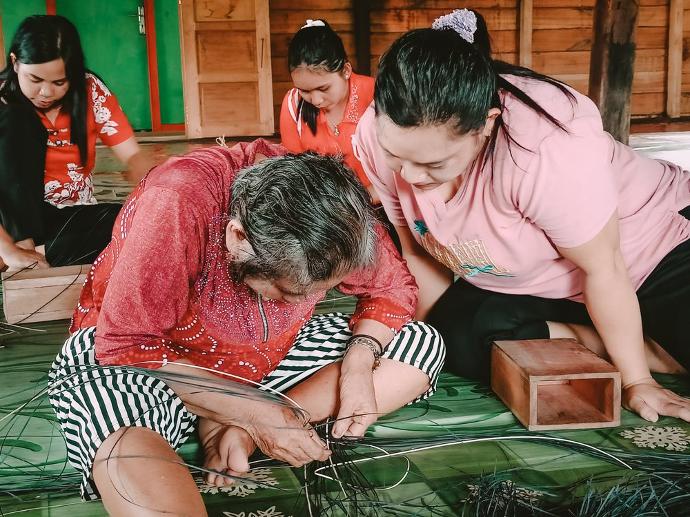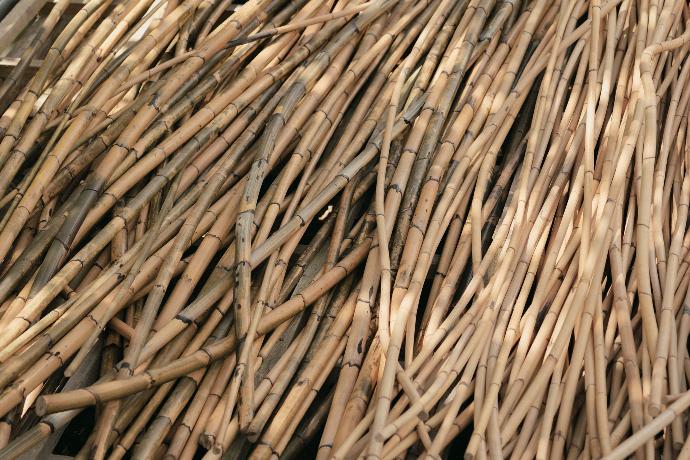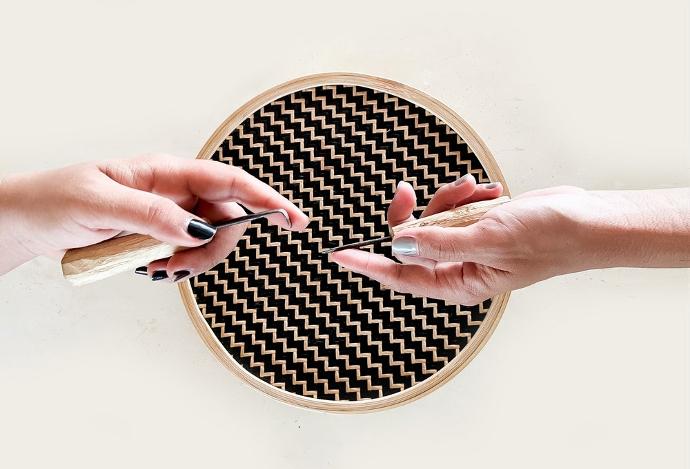
HANDEP - nachhaltige und verantwortungsvolle Denkweise
Das Kunsthandwerk in Zentral-Kalimanta ist nicht nur ein Ausdruck künstlerischer Fähigkeiten, sondern auch ein Mittel zur Bewahrung kultureller Identität und Traditionen. Viele dieser Kunsthandwerke werden von Generation zu Generation weitergegeben und sind ein wichtiger Teil des kulturellen Erbes. Das Rohmaterial wird von Bauern angebaut und geerntet, von Färbern mit natürlichen Material gefärbt, von Webern kunstvoll geflochten und von Dekorateuren liebevoll verarbeitet, bevor es schließlich zum Endverbraucher gelangt.
Die fortschreitende Globalisierung bringt eine Vielzahl von Problemen mit sich. Die Abholzung der Wälder schreitet voran, indigene Völker werden aus ihren angestammten Gebieten vertrieben und traditionelle Praktiken gehen nach und nach verloren. Der Gründer von HANDEP - Randi Julian Miranda - selber ein stolzer Dayak der in Kalimanta (indonesisch Borneo) geboren und aufgewachsen ist erlebt seit jeher, welchen Herausforderungen die indigenen Völker dieser Erde gegenüber stehen. Er ist überzeugt, dass indigene Gemeinschaften an der Spitze stehen um den Klimawandel zu bekämpfen. Deshalb sollen sie in der Lage sein sich an den Entscheidungen, die ihr Leben betreffen, teilhaben zu können.
Aus dieser Überzeugung hat er 2019 das Unternehmen HANDEP gegründet. Dies mit der Absicht, die indigenen Dayak wieder mit ihrem reichen Land und deren Kultur zu verbinden. Sie zu ermutigen, ihre Ressourcen zu nutzen und ihr Wissen über die traditionelle Handwerkskunst ihrer Vorfahren weiterzuführen. Als Gemeinschaft zusammen zu wachsen und eine nachhaltige Dorfwirtschaft zu schaffen.
Jede Tasche ein Unikat
Wusstest du, dass jedes Muster mir denen die HANDEP Taschen versehen sind, seine ganz eigene Herkunft und Bedeutung hat?
Unser Modell Lawangan wird von einem Kelakai Muster verziert. Kelakai ist eine essbare Farn Art welche in den üppigen Landschaften Borneos reichlich gedeiht. Dieser Farn findet in der traditionellen Küche des Dayak Volkes oftmals Verwendung.
Oder das Modell Katingan Canvas das mit einem Salegegot Muster geschmückt ist. Das Zick-Zack-Muster ahmt das Zusammenspiel der Elemente Wind und Wasser nach. Es stellt die Turbulenzen eines Flusses dar und bildet eine Geschichte von Bewegung und Veränderung ab.
Wenn du mehr über die verfügbaren Muster und Modelle wissen möchtest, dann kontaktiere uns gerne über das Kontaktformular.
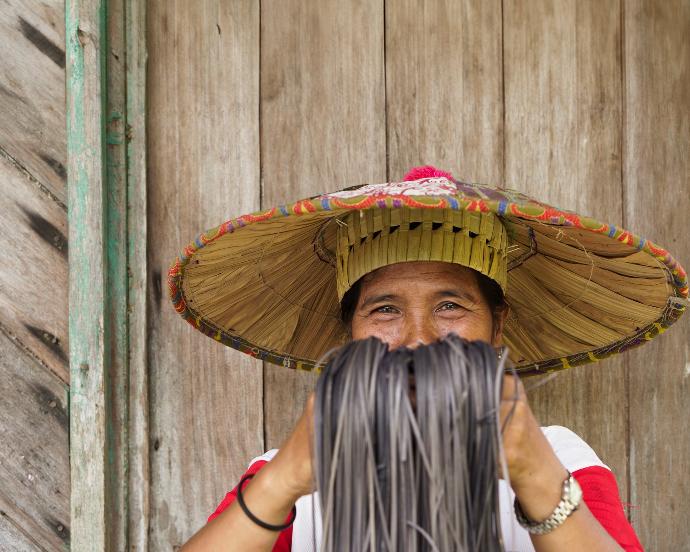
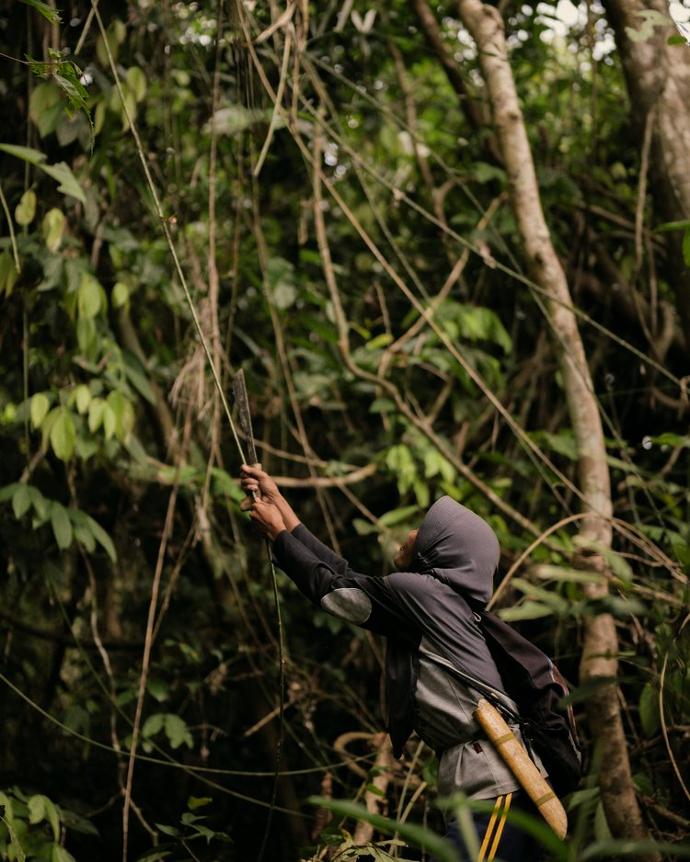
Rattan - ein schnell nachwachsender Rohstoff
Mit dem weltweit zunehmenden Bewusstsein für eine nachhaltige Lebensweise wird Rattan als alternatives nachhaltiges Material zu Holz immer beliebter. Rattan wächst im Vergleich zu anderen Hölzern sehr schnell und benötigt weniger Zeit um erntereif zu sein. In nur 4-7 Jahren erneuert sich diese Kletterpalme komplett. Produkte aus Rattan sind zudem vollständig biologisch abbaubar.
Das indigene Volk der Dayak in Kalimantan ist seit jeher stark auf die Ressourcen des Regenwaldes angewiesen, insbesondere auf Rattan. Sie haben eine starke jahrhundertealte, generationenübergreifende Beziehung zu Rattan, welches sie für Kunsthandwerk, Möbel und Baumaterialien verwenden.
Das Material bietet eine warme und einladende Optik, die sowohl in modernen als auch in traditionellen Produkten gut zur Geltung kommt. Als Material ist Rattan äusserst robust und langlebig. Gleichwohl ist das Material sehr leicht.
Die Taschen von HANDEP vereinen damit alles wofür wir bei Faedah Collection stehen - Nachhaltigkeit, Langlebigkeit, Schönheit und Funktionalität auf harmonische Weise. Sie tragen so zu einem umweltbewussten und stilvollen Lebensstil bei.
Wissenstransfer - Die Stütze einer ganzen Gemeinschaft
HANDEP unterstützt die lokale indigene Gemeinschaft durch Schulungen, Workshops und Entwicklung der dörflichen Infrastruktur. 2021 wurde ausserdem das Powering Artisans Scholarship ins Leben gerufen. Dies ist ein Programm, in dem Kunsthandwerker die Möglichkeit haben in anderen Dörfern Indonesiens zu studieren und ihre Fähigkeiten und Kenntnisse zu vertiefen.
Durch regelmässige Workshops wird das Wissen über die Kunst des Webens von der älteren an die jüngere Generationen weitergegeben. Damit leistet HANDEP einen grossen Beitrag um der lokalen Bevölkerung und insbesondere den Frauen eine nachhaltige Einkommensquelle zu sichern.
Jedes Jahr werden ausserdem Dare (Webwettbewerbe) organisiert um den Austausch unter den Partnerdörfern zu fördern.
